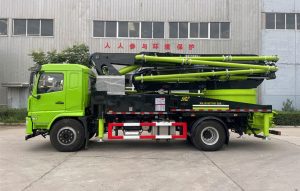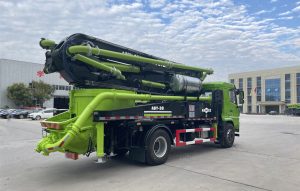The urgency and complexity of collapsed foundation repairs demand specialized equipment that combines mobility, power, and reliability. When sourcing a mobile concrete pump for sale from a reputable concrete pump company, several critical factors must be considered to ensure the equipment meets the unique challenges of emergency foundation repair work. Unlike standard construction projects, foundation collapse scenarios require rapid response capabilities, exceptional placement precision, and the ability to work in confined or compromised spaces. This comprehensive guide examines the key considerations when selecting a mobile concrete pump for foundation repair applications, covering technical specifications, company support services, operational features, and financial aspects that collectively determine the equipment’s effectiveness in these time-sensitive, high-stakes situations.
Assessing Pump Capacity and Pressure Requirements
The first technical consideration when evaluating a mobile concrete pump for sale involves matching the equipment’s capacity to foundation repair requirements. A competent concrete pump company will advise that collapsed foundation repairs typically demand pumps with higher pressure capabilities than standard construction projects, as the concrete often needs to be placed in tight, deep cavities or beneath existing structures. Look for models offering minimum 80 bar pumping pressure with capability to reach 120 bar for challenging scenarios. The volumetric capacity should typically range between 60-90 m³/h for most foundation repairs, allowing sufficient material placement speed without overwhelming the repair crew’s ability to properly consolidate and finish the concrete. Pay particular attention to the pump’s ability to handle specialty mixes often used in foundation repairs, such as high-strength, shrinkage-compensated, or rapid-setting concretes that may have different flow characteristics than conventional mixes.
Boom Configuration and Placement Flexibility
The boom design significantly impacts the mobile concrete pump’s effectiveness in foundation repair scenarios. When consulting with a concrete pump company, prioritize models with articulating booms offering both reach and maneuverability – typically 24-32 meter booms with 4-5 articulation points for working around obstacles. Consider the boom’s vertical and horizontal reach capabilities, as foundation repairs often require precise placement beneath structures or in deep excavations. The boom should have sufficient underreach capability to place concrete below grade level, a common requirement in foundation work. Look for features like automatic boom stabilization systems that maintain precise positioning even when working on uneven terrain near collapse zones. Some advanced models offer telescoping boom tips or robotic placement attachments that provide enhanced control when filling confined foundation cavities.
Mobility and Site Access Considerations
The mobile concrete pump’s ability to access compromised sites often determines its usefulness in foundation repair emergencies. Evaluate the chassis design and dimensions with your concrete pump company, ensuring the equipment can navigate tight urban spaces, residential driveways, or rough terrain typical of collapse sites. Four-axle pumps generally offer better weight distribution for working on unstable ground near foundation failures. All-wheel drive configurations provide enhanced mobility on soft or uneven surfaces. Consider the turning radius, overall length, and height clearance – particularly important when working around existing structures or overhead obstructions common in repair scenarios. The pump should have sufficient outrigger spread to stabilize the unit even when positioned near excavation edges or on limited footprint areas characteristic of foundation repair sites.
Reliability and Durability Features
Foundation repair operations cannot afford equipment breakdowns during critical concrete placement. When assessing a mobile concrete pump for sale, scrutinize the machine’s reliability features with your concrete pump company. Look for robust construction with reinforced boom sections and heavy-duty pumping components designed for continuous operation. The hydraulic system should have redundant safety features and fail-safes to prevent catastrophic failures during high-pressure pumping. Cooling systems must be oversized to handle extended runtime demands of emergency repairs. Electronic monitoring systems that provide real-time diagnostics help prevent minor issues from escalating into major failures. Consider the pump’s service accessibility – components likely to require maintenance during intensive repair operations should be easily reachable without extensive disassembly. Proven drivetrain components from reputable manufacturers typically offer better long-term reliability despite potentially higher initial costs.
Support Services and Emergency Response
The concrete pump company’s support network becomes particularly crucial when the equipment is used for time-sensitive foundation repairs. Evaluate the company’s availability of 24/7 technical support and emergency service response before purchasing a mobile concrete pump for sale. Inquire about typical response times for critical repairs and the availability of loaner equipment during extended downtime. The company should maintain adequate inventories of commonly replaced parts specific to your pump model. Look for providers offering comprehensive service contracts tailored to intensive repair applications, including priority scheduling and preventive maintenance programs. Training offerings should extend beyond basic operation to include troubleshooting common issues that may arise during foundation repair operations. A concrete pump company with extensive experience in emergency construction scenarios will typically provide more valuable support than general equipment suppliers.
Operational Efficiency and Fuel Economy
The intensive nature of foundation repair work makes operational efficiency a key factor in mobile concrete pump selection. Discuss with your concrete pump company the engine options available, balancing power requirements with fuel efficiency – particularly important for extended repair operations where the pump may run continuously for many hours. Modern pumps with variable displacement hydraulic pumps and engine management systems can significantly reduce fuel consumption during partial-load operation common in precise placement work. Evaluate the pump’s setup and preparation time – features like automatic pipeline lubrication and quick-connect hose systems minimize delays when responding to emergency repairs. Consider noise reduction features if working in residential areas, as many foundation collapses occur in occupied buildings where excessive noise may create additional complications.
Safety Systems for Hazardous Conditions
Collapsed foundation sites present numerous safety challenges that the mobile concrete pump must help mitigate rather than exacerbate. A responsible concrete pump company will highlight safety features like load moment indicators that prevent boom overloading when working on unstable ground. Outrigger pressure monitoring systems ensure proper stabilization before pumping begins. Look for pumps with emergency stop systems that can quickly halt all functions if unstable conditions develop. Boom cameras and proximity sensors help operators navigate tight spaces safely when visibility is limited. The pump’s lighting system should be robust enough for nighttime emergency operations common in foundation repairs. Consider additional safety accessories like ground penetration radar mounts that can help assess subsurface conditions before positioning the heavy pump near compromised foundation areas.
Compatibility with Foundation Repair Materials
Specialized foundation repair materials demand specific pumping capabilities that standard mobile concrete pump models may not provide. Discuss with your concrete pump company the pump’s ability to handle non-traditional materials like fiber-reinforced concrete, ultra-high-performance concrete (UHPC), or cementitious grouts with high solids content. The pumping system should accommodate additives like accelerators or superplasticizers that may be injected during placement. For repairs requiring low-slump concrete or mortar, verify the pump’s ability to move stiff mixes without excessive pressure that could damage pipelines or the receiving substrate. If using expansive or magnesium phosphate cements for rapid repairs, ensure all wetted pump components are compatible with these sometimes-corrosive materials.
Financial Considerations and Ownership Costs
While emergency foundation repairs may justify premium equipment, prudent financial analysis remains essential when selecting a mobile concrete pump for sale. A reputable concrete pump company should provide transparent total cost of ownership projections including expected maintenance costs, fuel consumption, and component replacement schedules. Evaluate financing options that align with your anticipated repair workload and cash flow patterns. Consider the pump’s expected resale value – models known for foundation repair applications often retain value better than general-purpose units. Look for warranty terms that cover intensive operation scenarios, as standard warranties may not adequately protect against the demands of emergency repair work. The potential revenue from being able to respond quickly to high-value foundation repair contracts may justify investing in higher-specification equipment than initially planned.
Technology Integration for Precision Repair
Modern mobile concrete pumps offer advanced technologies that provide significant advantages in foundation repair applications. When evaluating options with your concrete pump company, consider models with 3D placement guidance systems that help operators precisely fill voids and cavities based on engineering surveys. Pumps with automated pressure and flow control can adapt to changing material conditions during placement, critical when working with fast-setting repair materials. Telematics systems that record placement parameters provide valuable documentation for engineering reviews and warranty claims. Some advanced models integrate with ground-penetrating radar systems to verify material placement in obscured foundation areas. While these technologies increase the initial mobile concrete pump for sale price, they often prove cost-effective through reduced material waste, fewer callbacks, and improved repair quality.
Selecting the right mobile concrete pump from a qualified concrete pump company for collapsed foundation repairs requires careful evaluation of multiple technical and operational factors. The ideal pump combines robust construction with precise placement capabilities, reliable performance under demanding conditions, and support services that ensure maximum uptime during critical repair operations. By prioritizing pressure capacity, boom flexibility, site accessibility, and safety features specifically suited to foundation repair scenarios, contractors can build a rapid-response capability that differentiates their services in this specialized market. The investment in properly specified pumping equipment pays dividends not only through efficient project execution but also by establishing reputation as a go-to resource for emergency foundation stabilization. With thorough evaluation and selection guided by these key considerations, the purchased mobile concrete pump will serve as a valuable asset in addressing one of construction’s most challenging scenarios.


Leave a Reply